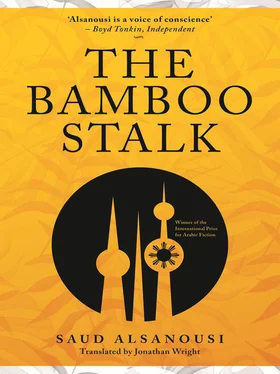She pointed at me. ‘Look at him! Look at everyone here!’
Merla rushed to the door, grabbed the door handle and pulled on it with all her might.
‘No, no, Merla, I beg you,’ said Mama Aida, her face covered in tears and snot, as she pressed her back against the door to keep it closed, but as usual Merla proved to be stronger.
The sound of the motorcycle faded into the distance and disappeared.
PART 3. Isa. . The First Wandering
‘To doubt God is to doubt one’s own conscience, and in consequence it would be to doubt everything.’
José Rizal
1
Now that Merla had left home, there was nothing left to persuade me to stay. If Mama Aida had been a reason to stay, she wasn’t any longer, especially when she went back to drinking and smoking after the fight with Merla.
I was sixteen. I left school. My mother was upset, but I had taken my decision. ‘I’m going to look for a job,’ I said.
When I took this decision I had only intended to break free of subjugation to Mendoza and the demands that had become intolerable after he fell ill. I was prepared to do the same kind of work that he gave me to do, provided it was somewhere else and provided I was paid for it. Once the things were gone that had me feel at peace on Mendoza’s plot of land — Aida’s good behaviour and Merla’s company — I no longer had any reason to stay. Mama Aida’s faith had made me feel that I wasn’t alone, and I had started to draw some peace of mind from her faith. When she abandoned her faith, I lost that sense, and my own weak faith was shaken. For the first time I felt I was alone and that I held my own fate in my hands. I was terrified when I realised that all I had to fall back on was my own resources.
My mother tried to dissuade me. She begged me. She warned me and threatened me. She sent Alberto to see me several times, but I had learned from Merla how to be stubborn and persistent. Only Uncle Pedro stood by me in my decision. He lent me some money and gave me a mobile phone. ‘Stay in touch,’ he said.
He arranged for me to meet a man he knew who sold bananas and said the man would help me. He put his hand on my head and said, ‘Listen, José. I don’t like to give advice, since I very much need it myself, but. .’ He took his hand off my head and put it on my shoulder. ‘If you want to avoid problems at work, make sure you’re on good terms with your boss. If you want to avoid problems in life, make sure you’re on good terms with the Lord.’
* * *
My grandfather’s health had deteriorated by this time and he made many more demands. He raved more at night, whether he’d been drinking tuba or not. The daily massage sessions, which once took one hour, now took several hours. The shouting at night, which I couldn’t stand, had changed into monologues addressed to his dead wife. He started shouting names I’d never heard before and when I asked Mama Aida about them, she said they were the names of people in our family who had died long before. Then he stopped the monologues and started shrieking frightening things like ‘Help! Help! He’s looking at me.’ I jumped out of bed, went to his house, and looked in the corner by the ceiling where he was looking, but there was nothing there. ‘Look at him, José,’ he said. ‘Can you see him? He’s pointing at me and telling me to go with him.’ He covered his face with his hands. ‘Help! Save me. I don’t want to go.’
‘There’s nothing, Grandfather. Nothing there,’ I said. I would have felt sorry for him if it wasn’t for my memories of how he had treated me.
With his hand over his face, he moved his fingers apart and peeked out between them. ‘Look at him! He’s there!’ he shrieked in terror.
I went over to the corner and waved my hands in the air. ‘There’s nothing there, Grandfather,’ I said.
‘Go closer, José. Go closer.’
At his insistence I went further into the corner. ‘Take him!’ he shouted, addressing no one. ‘Take him instead of me, please.’
My grandfather was as shameless in moments of weakness as he was in moments of strength.
I moved a small table up to the wall and stood on it, so that I could get my head right into the top corner of the room.
‘See, Grandfather. There’s nothing here,’ I said.
He pulled up the bed cover and hid under it. ‘Damn you!’ he sobbed. ‘I hope you grow a thousand eyes so you can see things clearly.’
I jumped off the table and went to the fruit basket in our kitchen. I picked up a pineapple and took it back to Grandfather’s house. He was still under the cover. I put the pineapple on the small table I’d been standing on and left, closing the door behind me.
* * *
I spent the whole day behind a cart selling bananas in Manila’s Chinatown. All I earned from my work was a commission on sales, which varied from day to day. But even on Saturdays and Sundays, the busiest days, it was hardly worth anything.
On the pavement opposite where I parked my cart, Cheng parked his cart, with the narrow street between us. Cheng was a Buddhist of Chinese origin, born in the year of the tiger, 4683 according to the Chinese calendar. He was eighteen at the time and worked for the same banana merchant. His commission was more than my commission and he sold twice as many bananas as me because of his experience in this work and because he knew so many customers. When I asked him if we could share a place to live, he asked me when I was born. I told him I was born on 3 April 1988. He closed his eyes, thought a while and counted on his fingers. ‘Year 4685, the year of the dragon,’ he said. ‘That’s excellent. We both have wood as our element.’ If I had been born in the year of the snake, the horse or the sheep, Cheng wouldn’t have let me share his room, because they have fire as their element, and wood and fire don’t go together, he said. Chinese astrology is complicated and Cheng didn’t trouble himself with the details. He just looked at the basic elements, such as earth, fire, water, wood and metal, and took his decision on that basis. It was the kind of madness that my Kuwaiti grandmother went in for when she decided whether things were good or bad omens, or so my mother had told me.
For a small amount, Cheng made space for me to share his little room on the second floor of an old building in a street close to Chinatown. The room had one window, which looked out on the Seng Guan Temple. When we spread our mattresses on the floor at night, there was only just room for a small fridge in which we kept our food in plastic containers. On my first night in his room I asked him why he had agreed to let me move in, given that the room was so small. ‘I need a voice to listen to, other than my own,’ he replied.
I pointed to behind the door, where there was a guzheng, or Chinese zither, leaning against the wall. ‘Isn’t the sound of your instrument enough?’ I asked.
He smiled and said, ‘I told you I need to hear a voice other than my own!’
Cheng had fixed shelves over the fridge and we put everything we owned on them: our clothes, towels, books, bars of soap, plastic noodle bowls, candles and small statues of the Buddha in various poses.
At night we lay on our mattresses, chatting in the dark until we fell asleep. One night, after I’d told Cheng where my father came from, he said, ‘Ah yes, Kuwait. I read that name in the list of goods for export in the office of the businessman where I used to work.’
He paused a while and then asked me where Kuwait was.
‘It’s close to Saudi Arabia,’ I said.
‘They don’t grow bananas there,’ he said, shaking his head. ‘They import them from here.’
‘If you were a banana, maybe you could go to your father’s country,’ he added with a laugh.
Читать дальше












